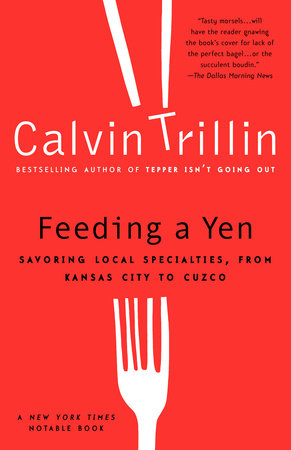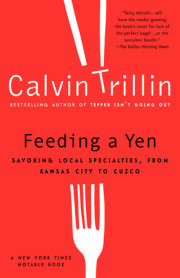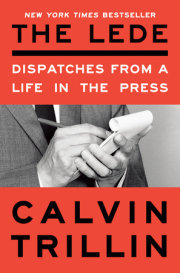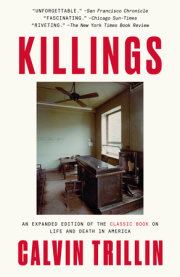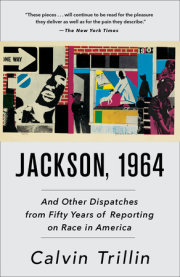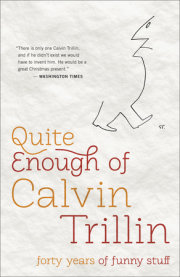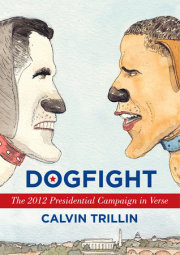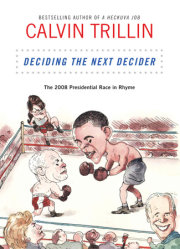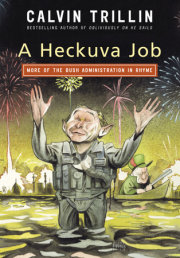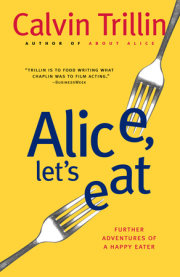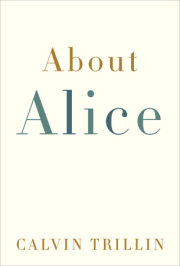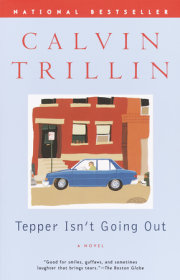1.
MAGIC BAGELNot long after the turn of the millennium, I had an extended father-daughter conversation with my older daughter, Abigail, on the way back from a dim sum lunch in Chinatown. Abigail, who was living in San Francisco, had come to New York to present a paper at a conference. As a group of us trooped back toward our house in Greenwich Village, where she'd grown up, Abigail and I happened to be walking together. "Let's get this straight, Abigail," I said, after we'd finished off some topic and had gone along in silence for a few yards. "If I can find those gnarly little dark pumpernickel bagels that we used to get at Tanenbaum's, you'll move back to New York. Right?"
"Absolutely," Abigail said.
There's a great comfort in realizing that a child you've helped rear has grown up with her priorities straight. When I phoned Abigail from the Oakland airport once to ask if she knew of an alternative route to her house in San Francisco--I'd learned of a huge traffic jam on the normal route, toward the Bay Bridge--she said, "Sure. Go south on 880, take 92 west across the bridge to 101, and we'll meet you at Fook Yuen for lunch." Fook Yuen is a dim sum restaurant in Millbrae, about five minutes from the San Francisco airport, and its way with a dumpling has persuaded us that flights in and out of San Francisco are best scheduled in the middle of the day. I report this response to a traffic jam as a way of demonstrating not simply that Abigail always has a fallback career as a taxi dispatcher awaiting her but also that she has the sort of culinary standards that could induce her to switch coasts if the right bagel came along.
But when I mentioned the Chinatown walk exchange to my wife, Alice, she had a different interpretation. She said that Abigail had been speaking ironically. I found it difficult to believe that anybody could be ironic about those bagels. They were almost black. Misshapen. Oniony. Abigail had always adored them. Both of my daughters have always taken bagels seriously. When my younger daughter, Sarah, was a little girl, I revealed in print that she wouldn't go to Chinatown without carrying a bagel--"just in case." At the time that Abigail and I had our conversation about the gnarly black pumpernickel bagel, Sarah was also living in California, in Los Angeles. She seemed perfectly comfortable with the Chinese food there. In fact, when I'd eaten with her at Chinois on Main, in Santa Monica, it occurred to me that her knowledge of the menu was nearly encyclopedic. She had many years before outgrown the need to have a bagel with her at a Chinese restaurant--which was fortunate indeed, because bagels in California were not anywhere near up to her standards.
For a while, I brought along a dozen or two New York bagels for Sarah whenever I went to Southern California, but I finally decided that this policy was counterproductive. "If a person prefers to live in California, which happens to be thousands of miles from her very own family," I told her, "it seems to me appropriate that such a person eat California bagels. I understand that in some places out there if you buy a dozen wheat germ bagels you get your choice of a bee pollen bagel or a ginseng bagel free." Sarah eventually moved back East. I'm not going to make any claims for the role of my bagel-withholding policy in that decision, but the fact remains: she did eventually move back East.
I have previously recorded Abigail's response, at age four or five, when, on a visit to my family in Kansas City, Missouri, she'd worked her way partly through a bagel I can describe, given my affection for my hometown, as an honest effort that had simply fallen way short of the mark, the baker having been put in the position a New York deli cook would have found himself in if asked to turn out a bowl of andouille gumbo. "Daddy," she said, "how come in Kansas City the bagels taste like just round bread?" In other words, she knew the difference between those bagel-shaped objects in the Midwest and the authentic New York item that had been hand-rolled and boiled in a vat and then carefully baked by a member in good standing of the Bakery and Confectionery Workers International Union. I think it might be fair to characterize her as having been a bagel prodigy.
When I was a child, bagel consumption in Kansas City was not widespread. Bagels were thought of as strictly Jewish food, eaten mainly in New York. In those days, of course, salsa would have been considered strictly Mexican food, if anybody I knew in Kansas City had ever given any consideration to salsa. I doubt if many gentiles in Kansas City had ever heard of a bagel, let alone eaten one. Bagels were available in only two or three stores, one of which was called the New York Bakery. It was only in the real New York that bagels were part of the culture, for both Jews and gentiles. New Yorkers have always talked about picking up freshly baked bagels late at night and being reassured, as they felt the warmth coming through the brown paper bag, that they would be at peace with the world the next morning, at least through breakfast. They've talked about that day in the park when nothing seemed to soothe their crying baby until a grandmotherly woman sitting on a nearby bench, nattering with another senior citizen about Social Security payments or angel food cake recipes or Trotskyism, said that the only thing for a teething infant was a day-old bagel. They've talked about the joy of returning to New York from a long sojourn in a place that was completely without bagels--Indonesia or a tiny town in Montana or some other outpost in the vast patches of the world that New Yorkers tend to think of as the Bagel Barrens.
Roughly corresponding to the time it took our girls to grow up and move to California, bagels had become assimilated. Gefilte fish was still Jewish food, but not bagels. The bagel had gone from a regional ethnic food to an American standard, served at McDonald's and available on supermarket shelves all over the part of America that baked-goods sociologists have long identified with white bread. At one point, I read that, because of a new plant established by one of the firms producing supermarket bagels, the state that led all other American states in turning out bagels was Iowa. A couple of years before Abigail and I discussed pumpernickel bagels on the way back from Chinatown, The New York Times had run a piece by Suzanne Hamlin reporting that in places recently introduced to bagels, emergency rooms were seeing an increasing number of bagel-related injuries--cuts, gouges, and severed digits caused by "impatient eaters who try to pry apart frozen bagels with screwdrivers, attempt to cut hard bagels with dull knives and, more than likely, use their palms as cutting boards." There had been no increase in New York bagel injuries.
From the Times story, you could draw the conclusion that a lot of Americans were being given access to bagels before they knew how to handle them, in the way that a lot of Americans are said to have access to 9-mm pistols or semiautomatic rifles before they know how to handle them. I suspect any number of New Yorkers responded to the story by saying, in the superior tone customarily used by someone from Minneapolis who's relating the chaos caused in Birmingham by a simple snowstorm, "People there just don't have any experience in such things"--or, as the director of emergency medicine at Bellevue did say to the Times, "Those people just aren't ethnically equipped."
Aside from the safety issue, the mainstreaming of formerly ethnic or regional food like bagels must have been confusing for those citizens who grew up before it became common to find Cajun restaurants in upper midwestern shopping malls and lobster shacks in Amarillo. In the eighties, when it was revealed that eating poppy-seed bagels could result in a false positive on a drug test, I saw one of the perils inherent in everybody's suddenly eating everything, whether ethnically equipped or not. I envisioned an applicant to the FBI academy who seems in the tradition of the bureau: he's a well-set-up young man with a square jaw and a direct gaze. He's almost maddeningly polite. His name is O'Connor. He went to Fordham. He always wears a suit and a white shirt and wing-tipped shoes. His father was in the bureau. His drug test seems to indicate that he's a user.
O'Connor is looking stunned. "I can't understand it," he says. "Maybe it was something I ate."
"Oh, yeah, I'm sure that was it," the tester, a grizzled agent near retirement age, says sarcastically. "We all know how corned beef and cabbage can mess up these results."
"You don't think it could have been those chiles rellenos I had for lunch, do you?" O'Connor says, ignoring the sarcasm. "That pico de gallo that came with them was pretty hot stuff."
"Maybe you can catch on with the Parks Department, O'Connor," the tester says, in a more sympathetic tone. "Or Sanitation. You're a husky lad."
"I can't believe blackened redfish would do it," O'Connor says. "Maybe it was that braised bok choy I had with my squid last night. That's all I've eaten lately, except for the poppy-seed bagels with lox and cream cheese that Father Sweeney served at the Holy Name Society breakfast this morning."
"The dope is making you talk crazy, son," the tester says.
The sad part is that they would have almost certainly been inferior poppy-seed bagels. Provisions for the Holy Name Society breakfast might well have been purchased at the local supermarket or at one of those places that make bagels with weird ingredients--blueberries, say, and cinnamon, and more air than you'd find in a Speaker of the House. O'Connor, not having been raised in the connoisseurship, probably wouldn't have known the difference. Not so my daughters. When they were children, bagels were not only their staple food--the food they clung to in unfamiliar surroundings--but also the food used in important rituals. On Sunday mornings, I often took them to Houston Street, on the Lower East Side. At Russ & Daughters, which is what New Yorkers refer to as an appetizing store, we would buy Nova Scotia salmon. Then we'd go next door to Ben's Dairy to get cream cheese and a delicacy known as baked farmer's cheese with scallions. Then we were at Tanenbaum's, a bakery that was probably best known for a large, dark loaf often referred to as Russian health bread. We were not there for Russian health bread. We were there for Abigail's pumpernickel bagels. Abigail had never exhibited any irony when the subject was pumpernickel bagels. Would Proust have been ironic about the madeleine, particularly if he had fetched up in a place where you couldn't get a decent madeleine if your life depended on it?
"So you think she's just humoring her old dad?" I asked Alice, during our discussion of the bagel conversation I'd had with Abigail on the way back from Chinatown.
"I do."
Alice was probably right. I understood that. Abigail was enjoying California, and she had a job there that she loved. As I've admitted before, my daughters have simply made good on their implicit threat to grow up and lead lives of their own. Parents are supposed to accept that. Still, I decided that I'd look around for those pumpernickel bagels. As my father used to say, "What could it hurt?"
It wasn't my first try. When the pumpernickel bagels disappeared, I immediately made serious inquiries. Without wanting to cast blame, I have to say that the disappearance occurred on Mutke's watch. Mutke's formal name is Hyman Perlmutter. In the early seventies, he bought Tanenbaum's Bakery and transformed it into the downtown branch of a bakery he ran eight or ten blocks away called Moishe's. For some time, Mutke carried Tanenbaum's full inventory. Then, one day--I don't remember precisely when, but Abigail and Sarah were still living at home--the pumpernickel bagels were no longer there. Confronted with the facts, Mutke was sanguine. Those particular bagels weren't available anymore, he explained, but, as a special order, he could always provide me with a dozen or two just like them. Eventually, he did. I pulled one out of the bag. It was a smooth bagel, uniformly round. It was the color of cappuccino, heavy on the milk. It was a stranger to onions. It was not by any means Abigail's bagel.
I realize now, of course, that I gave up too easily. Sure, I stopped by to try the pumpernickel any time I heard of a promising new bagel bakery--even if it was uptown, a part of the city I don't venture to unnecessarily. But I didn't make a systematic, block-by-block search. I didn't make the pumpernickel bagel my number-one priority. How was I to know that bagels can be instrumental in keeping families intact? This time, I was going to be thorough. I'd read in Molly O'Neill's New York Cook Book about a place in Queens where bagels were made in the old-fashioned way. I figured that there must be similar places in Brooklyn neighborhoods with large populations of Orthodox Jews--Williamsburg, maybe, or Borough Park. I was prepared to go to the outer boroughs. But I thought it made sense to start back on Houston Street.
The area where Abigail and Sarah and I used to make our Sunday rounds has seen some changes over the years. The old tenement streets had once seemed grim, but at some point in the nineties they began to sport patches of raffish chic. On Orchard Street, around the corner from our Sunday-morning purveyors, stores that traditionally offered bargains on fabrics and women's clothing and leather goods became punctuated by the sort of clothing store that has a rack of design magazines and a coffee bar and such a spare display of garments hanging on exposed-brick walls that you might think you're in the studio apartment of someone who has rather bizarre taste in cocktail dresses and no closet to keep them in. At some point the Lower East Side became a late-night destination--both Orchard and Ludlow acquired bars too hip to need signs--and a cool place to live. Around the time I started looking for the pumpernickel bagel in earnest, an apartment on one of the old tenement blocks of Orchard Street changed hands for a million dollars. I could only hope for the new owner's sake that his old zayde wasn't still alive ("You paid what! To live in a place we worked sixteen hours a day to get out of you paid what!"). After spending years listening to customers tell him that he ought to move Russ & Daughters uptown, Mark Federman--the grandson of Joel Russ, the founder--was renovating the apartments above the store and expressing gratitude that his grandfather had held on to the building.
Copyright © 2003 by Calvin Trillin. All rights reserved. No part of this excerpt may be reproduced or reprinted without permission in writing from the publisher.

